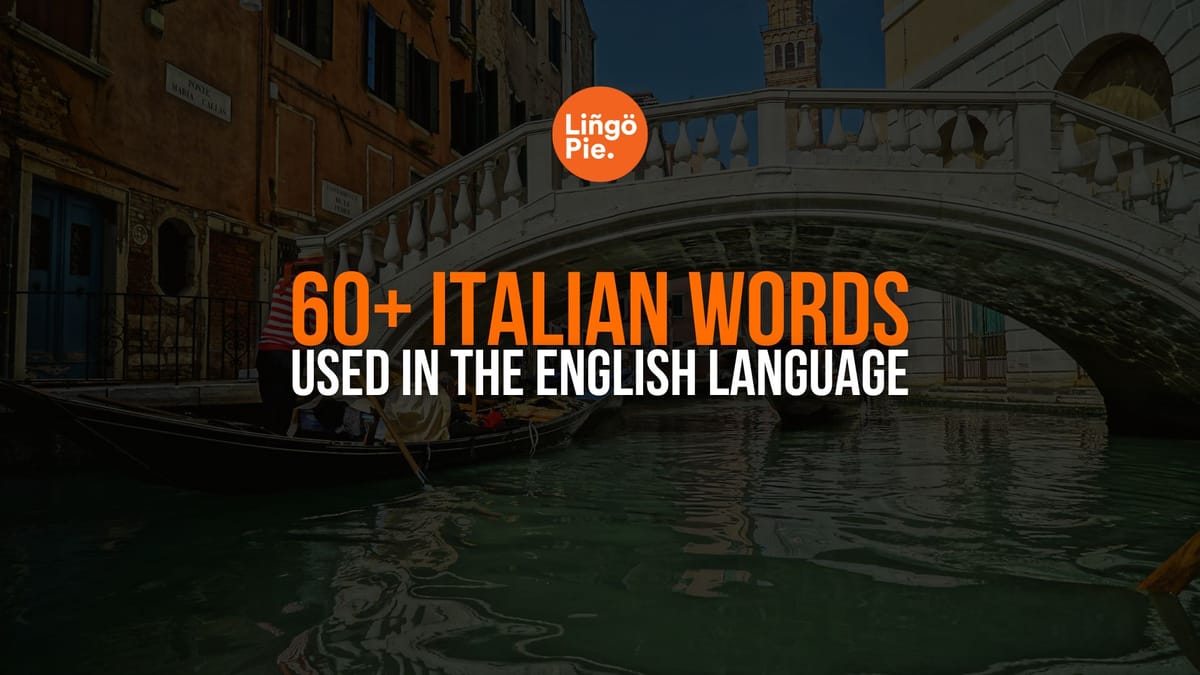You probably think learning Italian means starting from zero. Here's a surprise: you already know dozens of Italian words.
That morning cappuccino? The pizza you grab for lunch? The scenario you're planning at work? All Italian. You've been using these words your whole life without realizing where they came from.
If you're starting to learn Italian, you've got a massive head start. These familiar words give you pronunciation practice, grammar patterns, and cultural insights before you even open a textbook. Let's explore how these everyday English words are actually your first Italian vocabulary lesson.
- 12 Italian Jokes That'll Test Your Skills In Italian
- 20+ Easy Italian Short Stories To Learn The Language
- What Is The Best Way To Learn Italian On Your Own?

Why Italian Stuck
During the Renaissance (14th-17th centuries), English-speaking artists and scholars flocked to Italian cities like Florence and Venice. They encountered art, music, and ideas that had no English equivalent, so they borrowed the Italian terms. Italian is a Romance language descended from Latin, and English—despite being Germanic—was heavily influenced by Latin during this period.
The result? English vocabulary basically doubled during the Renaissance!
Italy didn't stop influencing English after the Renaissance. Through waves of immigration, especially to America, Italian words for food became everyday vocabulary. Italian fashion houses made Milano a global style capital, and Italian terms for clothing and design followed. Today, you can't discuss food, music, art, or fashion without using Italian words.
Italian Words Used In English
Food In Italian

Italian cuisine has conquered the world, and with it, Italian food vocabulary has become part of English. Many Italian food words are already plural in English, which trips up English speakers learning Italian. When you say "spaghetti," you're using the plural of "spaghetto"—one single strand. Same with ravioli (raviolo), gnocchi (gnocco), and broccoli (broccolo).
- Pasta: In Italian, this also means dough, paste, or even character/temperament
- Pizza: Can mean "boring" in Italian slang (Che pizza! = How boring!)
- Spaghetti: Plural of "spaghetto"
- Ravioli: Plural of "raviolo" - originally served with broth
- Gnocchi: Plural of "gnocco" - pronounced "nyok-kee"
- Lasagna: Singular is the noodle, "lasagne" (plural) is the dish
- Macaroni: From "maccherone"
- Broccoli: Plural of "broccolo"
- Cappuccino: Just called "caffè" in Italy
- Latte: Order this in Italy and you'll get a glass of milk. You want "caffè latte"
- Al dente: "To the tooth" - how pasta should feel when you bite it
- Antipasto: "Before the meal" (anti = before, pasto = meal)
- Pepperoni: Here's the twist - Italian "peperoni" means bell peppers. What we call pepperoni is "salame piccante"
- Panini: Plural form. One sandwich is a "panino"
- Gelato: Simply means "frozen"
- Bruschetta: From "bruscare" meaning "to roast over coals"
- Mozzarella: From "mozzare" meaning "to cut"
- Prosciutto: Etruscan tribes prepared it as early as 900 BC
- Salami: From Latin "salare" meaning "to salt"
- Pesto: Means "crushed" - ingredients ground together
- Risotto: Originally always spiced with saffron
- Tiramisù: Literally means "pick me up"
Music And Art In Italian

Italian dominated Renaissance art and music, which is why so many technical terms come from Italian. Understanding these words gives you insight into how Italians organized and thought about artistic expression.
- Opera: Means "work" or "composition"
- Solo: "Alone"
- Aria: "Air"
- Crescendo: "Growing" or "increasing"
- Allegro: "Happy" or "lively"
- Adagio: "At ease" - tempo close to a heartbeat
- Finale: Started as a music term, now means any ending
- Soprano: From "sopra" meaning "high"
- Alto: "High" - upper men's or lower women's vocal range
- Maestro: "Master"
- Virtuoso: Originally meant any talented person or scholar
- Ballerina: From "ballare" meaning "to dance"
- Diva: Means "goddess" - became more negative in English
- Falsetto: From "falso" meaning "false" voice
- Fresco: "Fresh" - painted on wet plaster
- Graffiti: From "graffio" meaning "scratch"
- Studio: "Room for study"
- Scenario: Originally meant scenery or landscape
These words help Italian learners because they're often used exactly the same way in Italian, and they come with cultural context about Italian values around art and individual expression.
Everyday Words In Italian

Some Italian words have become so integrated into English that we forget their origins.
- Umbrella: From "ombrello" meaning shade or shield
- Bank: From "banca" (meaning bench - where money changers worked)
- Volcano: "Vulcano" meaning "burning mountain"
- Influenza: Entered English after an Italian flu epidemic. We say "flu" for short
- Malaria: "Mal'aria" means "bad air"
- Casino: Originally meant "little house"
- Confetti: Plural of "confetto" meaning sweetmeat (Italian candies)
- Fiasco: Means "flask" - complete failure
- Vendetta: "A feud"
- Ciao: From Venetian "sciavo" meaning "(your humble) servant"
- Bravo: "Brave" - used to praise performers
- Manifesto: "Public declaration"
- Arsenal: From "arzenale"
- Fascism: From "fascismo"
- Ghetto: Originally slang for "borghetto" (small borough)
- Lottery: From "lotteria" based on "lotto" (share)
- Paparazzi: From a character in Fellini's "La Dolce Vita"
- Bandit: From "bandito" meaning outlaw
- Ditto: From "dire" meaning "to say"
- Gonzo: Means "rude" - popularized by Hunter S. Thompson
- Piccolo: Means "small" - the flute is called "ottavino" in Italian
Style And Design In Italian

Italy's fashion influence runs deeper than most people realize. Milan is a global fashion capital, and Italian fashion terminology reflects centuries of textile tradition and design innovation.
- Stiletto: Originally an Italian word for a small dagger, it now refers to a high-heeled shoe
- Jeans: This one is kind of cheating because technically, it was taken from the French jean fustian, but that phrase means "cloth of Genoa," an Italian city
- Palazzo pants: From "palazzo" meaning palace - these wide-leg pants were named for their palatial, flowing shape
- Capri pants: Named after the Italian island of Capri, where they became popular in the 1940s
- Sprezzatura: The art of "calculated carelessness" - looking effortlessly elegant (recently adopted)
- Su misura: Made-to-measure or custom-made clothing
- Sartoria: Tailoring house or the craft of tailoring
Common Mistakes to Avoid
Even though you know these Italian words, using them incorrectly can mark you as a tourist. Here are the biggest mistakes English speakers make:
Ordering mistakes in Italy
Order a "latte" and you'll get milk, not coffee. Ask for "pepperoni pizza" and you'll get bell peppers. Say you want "panini" (plural) when you mean one sandwich—it's "panino" (singular).
Pronunciation pitfalls
"Gnocchi" isn't "no-key"—it's "nyok-kee" with that distinctive gn sound. "Bruschetta" isn't "broo-shetta"—it's "broo-SKET-ta" with a hard ch. Double consonants matter: "penne" has a longer n sound than "pene" (which means penis).
Grammar assumptions
Don't add English plurals to Italian words already plural. It's "ravioli," not "raviolis." "Spaghetti" is already plural—one strand is "spaghetto."
Context confusion
"Diva" originally meant "goddess" in Italian, not a difficult person. "Casino" means "little house" or "mess," not gambling establishment. Understanding original meanings helps you use these words correctly.
Why This Matters for Italian Learners
Starting with these familiar words gives you a massive advantage when learning Italian. Here's how to use this knowledge strategically:
- Instant confidence boost: You already know 50+ Italian words before you even start studying. That's a solid foundation that proves Italian isn't as foreign as it seems.
- Sound pattern recognition: Words like "gnocchi" (nyok-kee) and "bruschetta" (broo-SKET-ta) teach you Italian pronunciations. The "gn" sound (like "canyon") and double consonants are everywhere in Italian.
- Grammar insights: Understanding why "spaghetti" is plural prepares you for Italian grammar. Most masculine nouns ending in -o become -i in plural (like broccolo → broccoli).
- Cultural shortcuts: These words come with built-in cultural knowledge. Knowing that Italians say "caffè" not "cappuccino" teaches you about Italian coffee culture before you even visit Italy.
- Memory anchors: Use these familiar words as anchors for new vocabulary. Once you know "pasta" means dough, learning "pasticceria" (pastry shop) becomes easier.
When watching Italian content on platforms like Lingopie, you'll recognize these words instantly, making it easier to follow conversations. Hearing how Italians actually use "bello," "ciao," or "famiglia" in context helps you understand natural speech patterns.
Start Learning Italian Today
Ready to expand beyond these familiar words? Start your Italian journey with Lingopie, where you can hear these words in their natural context through authentic Italian TV shows and movies. From pasta-making shows to Italian films, you'll discover how these borrowed words fit into real conversations—and pick up hundreds more along the way.
FAQ
What does "ciao" mean?
"Ciao" means both "hello" and "goodbye" in Italian. It comes from Venetian "s-ciavo" meaning "I am your slave/servant." It's informal—use it with friends, not in business settings.
What is "la dolce vita"?
"La dolce vita" means "the sweet life"—a carefree, indulgent lifestyle. Made famous by Fellini's 1960 film of the same name. It represents the Italian ideal of enjoying life's pleasures.
What does "prego" mean?
"Prego" means "you're welcome," "please" (when offering something), or "after you." It's from the verb "pregare" (to pray/beg). Use it after someone says "grazie" (thank you).
What does "bene" mean?
"Bene" means "well" or "good." You'll hear it in "come stai?" "bene, grazie" (how are you? well, thanks). It can also mean "okay" when agreeing to something.
What is "bella" or "bello"?
"Bella" (feminine) and "bello" (masculine) mean "beautiful." Italians use it casually—"Ciao bella!" means "Hi, beautiful!" It's not always romantic; friends use it too.
What does "basta" mean?
"Basta" means "enough" or "stop." Use it when you've had enough of something. "Basta così" means "that's enough" or "that'll do."
What is "amore"?
"Amore" means "love." It's used for romantic love, family love, or things you love. "Amore mio" means "my love"—a common term of endearment.
What does "mamma mia" mean?
"Mamma mia" literally means "my mother" but expresses surprise, frustration, or amazement. Think "oh my god!" It's not necessarily about your actual mother.




![Language Difficulty Ranking For English Speakers [2026]](/blog/content/images/2025/05/Language-Difficulty-Ranking----For-English-Speakers.png)

![17 Best Italian Series and Movies On Netflix [For Beginners]](/blog/content/images/size/w300/2026/02/Italian-TV-Shows.jpg)
![How To Say I Love You In Italian Like A Native Speaker [Guide]](/blog/content/images/size/w300/2025/01/I-Love-You-In-Italian.jpg)
![8 Best Apps To Learn Italian As A Beginner [RANKED]](/blog/content/images/size/w300/2026/01/Best-Apps-To-Learn-Italian.jpg)
![6 Best Italian Translator Apps For Learners [TESTED]](/blog/content/images/size/w300/2026/01/Best-Italian-Translation-Apps.jpg)